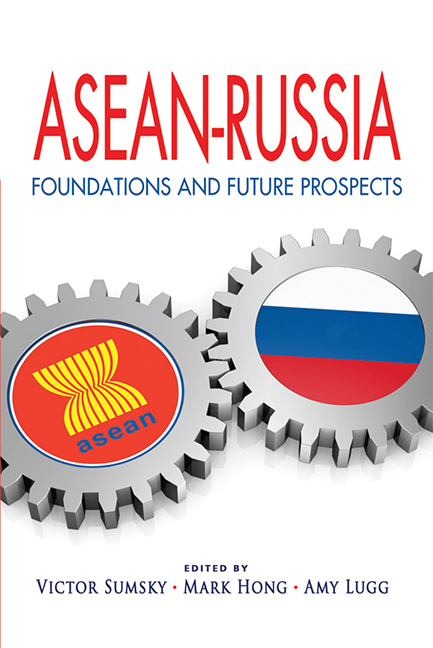Book contents
- Frontmatter
- Contents
- Foreword
- Preface
- About the Contributors
- Keynote Address
- Opening Remarks
- Keynote Address
- Introduction: Russia and the ASEAN Member States: Political and Economic Cooperation in Progress
- SECTION I WISEMEN'S VIEWS
- SECTION II GEOPOLITICS
- SECTION III BILATERAL RELATIONS
- SECTION IV Business and Economics
- Russia and ASEAN-4: Potential and Realms of Cooperation
- Russia's Economic Relations with the APEC Region
- Russia Looks East: Modernization Plans and Cooperation with ASEAN
- Indonesian and Russian Oilmen: Sharing Experiences and Learning from Each Other
- Towards a Roadmap for Russia-ASEAN Trade and Economic Cooperation
- The Best Cities to Buy Into
- SECTION V CULTURE AND EDUCATION
- EPILOGUE
- Index
Russia and ASEAN-4: Potential and Realms of Cooperation
from SECTION IV - Business and Economics
Published online by Cambridge University Press: 21 October 2015
- Frontmatter
- Contents
- Foreword
- Preface
- About the Contributors
- Keynote Address
- Opening Remarks
- Keynote Address
- Introduction: Russia and the ASEAN Member States: Political and Economic Cooperation in Progress
- SECTION I WISEMEN'S VIEWS
- SECTION II GEOPOLITICS
- SECTION III BILATERAL RELATIONS
- SECTION IV Business and Economics
- Russia and ASEAN-4: Potential and Realms of Cooperation
- Russia's Economic Relations with the APEC Region
- Russia Looks East: Modernization Plans and Cooperation with ASEAN
- Indonesian and Russian Oilmen: Sharing Experiences and Learning from Each Other
- Towards a Roadmap for Russia-ASEAN Trade and Economic Cooperation
- The Best Cities to Buy Into
- SECTION V CULTURE AND EDUCATION
- EPILOGUE
- Index
Summary
INT RODUCTION
While announcing its desire to integrate with the Asia-Pacific region in the first post-Soviet decade, Russia was in fact moving away from Vietnam, Laos, and Cambodia — the countries with which the USSR had very close and friendly relations. However, the decision to turn to Asia was hindered by an evident lack of political will. Customarily ascribing priority to its relations with the West, Russia only occasionally switched to cultivating ties with the Asia Pacific.
Perhaps, Moscow was expecting larger, richer, and technologically more advanced partners to turn up. What followed was a lesson in pragmatism. As Russia pulled out of Indochina and expressed its readiness to do business with prosperous East Asian and Pacific nations, their own entrepreneurs, diplomats, and the military were quickly moving into the cooperation environment it had vacated. By the start of the twenty-first century, Russia's former Indochina allies and Myanmar, too, had joined the Association of Southeast Asian Nations (ASEAN) and opened up for investments from Southeast Asian neighbours, China, Japan, South Korea, and the U.S. Having speeded up their economic growth, they are keeping sustaining it at a pretty high rate.
THE ASEAN-4
In today's perspective, repairing and advancing Russia's relations with the group of “new” Association members (now known as ASEAN-4) looks neither secondary nor unpromising. In fact, it is the other way around. There is growing awareness, at least among the experts (and hopefully, among decision-makers too), that this is a chance to reinforce our position not just in terms of dealing with ASEAN but with the whole of East Asia.
Memories of how the Soviet Union helped these countries in difficult moments of their recent past are still alive. The views of the present Russian leaders and their Indochina counterparts on global and regional politics are largely similar. There is also demand for Russian technologies, goods, and services, and for understandable reasons: not all the needs of the four Indochina countries are met by more developed neighbours and the West.
- Type
- Chapter
- Information
- ASEAN-RussiaFoundations and Future Prospects, pp. 207 - 218Publisher: ISEAS–Yusof Ishak InstitutePrint publication year: 2012



